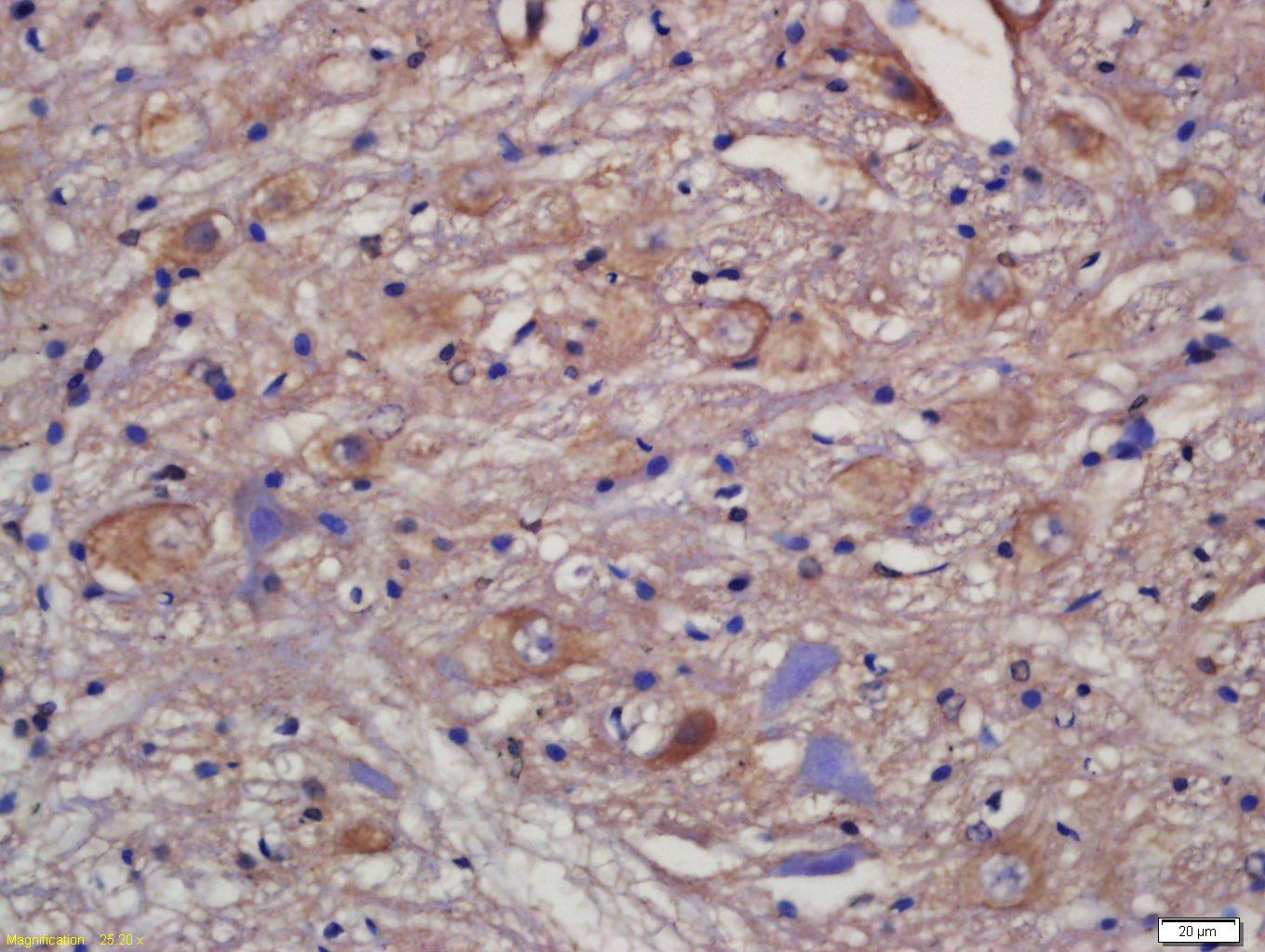
Rabbit Anti-LRP130/LRPPRC antibody
LRPPRC; 130 kDa leucine-rich protein; GP130; Leucine-rich PPR-motif containing protein; LRP 130; LPPRC_HUMAN.
View History [Clear]
Details
Product Name LRP130/LRPPRC Chinese Name 富含亮氨酸蛋白LRP130抗体 Alias LRPPRC; 130 kDa leucine-rich protein; GP130; Leucine-rich PPR-motif containing protein; LRP 130; LPPRC_HUMAN. Research Area Cell biology immunology Neurobiology Signal transduction Immunogen Species Rabbit Clonality Polyclonal React Species Rat, (predicted: Human, Mouse, Chicken, Horse, Rabbit, ) Applications ELISA=1:5000-10000 IHC-P=1:100-500 IHC-F=1:100-500 ICC=1:100-500 IF=1:100-500 (Paraffin sections need antigen repair)
not yet tested in other applications.
optimal dilutions/concentrations should be determined by the end user.Theoretical molecular weight 152kDa Cellular localization The nucleus cytoplasmic The cell membrane Form Liquid Concentration 1mg/ml immunogen KLH conjugated synthetic peptide derived from human LRP130: 165-270/1394 Lsotype IgG Purification affinity purified by Protein A Buffer Solution 0.01M TBS(pH7.4) with 1% BSA, 0.03% Proclin300 and 50% Glycerol. Storage Shipped at 4℃. Store at -20 °C for one year. Avoid repeated freeze/thaw cycles. Attention This product as supplied is intended for research use only, not for use in human, therapeutic or diagnostic applications. PubMed PubMed Product Detail Leucine-rich protein (LRP130) is a cytoplasmic mRNA-binding protein likely to be involved in the processing of mitochondrial DNA transcripts. Defects in the LRPPRC gene that encodes LRP130 result in the French-Canadian type of Leigh syndrome, a severe neurological disorder characterized by lesions in the subcortical region of the brain. LRP130 also interacts with the low-affinity receptor for leukemia inhibitory factor to produce an intracelluar signal cascade.
Function:
LPPRC is thought to play a role in RNA metabolism in both nuclei and mitochondria. In the nucleus, LPPRC binds to HNRPA1-associated poly(A) mRNAs and is part of nmRNP complexes at late stages of mRNA maturation, which are possibly associated with nuclear mRNA export. In mitochondria, LPPRC binds to poly(A) mRNA. LPPRC may play a role in translation or stability of mitochondrially encoded cytochrome c oxidase (COX) subunits. Defects in LRPPRC are the cause of Leigh syndrome French-Canadian type (LSFC). Leigh syndrome is a severe neurological disorder characterized by bilaterally symmetrical necrotic lesions in subcortical brain regions that is commonly associated with systemic cytochrome c oxidase (COX) deficiency. In the Saguenay-Lac Saint Jean region of Quebec province in Canada, a biochemically distinct form of Leigh syndrome with COX deficiency has been described. Patients have been observed to have a developmental delay, hypotonia, mild facial dysmorphism, chronic well-compensated metabolic acidosis, and high mortality due to episodes of severe acidosis and coma. Enzyme activity was close to normal in kidney and heart, 50% of normal in fibroblasts and skeletal muscle, and nearly absent in brain and liver.
Subunit:
Interacts with INPP5D/SHIP1 (By similarity). Forms heterodimers composed of LIPR and IL6ST (type I OSM receptor). Also forms heterodimers composed of OSMR and IL6ST (type II OSM receptor). Homodimer. The homodimer binds two molecules of herpes virus IL6. Component of a hexamer of two molecules each of IL6, IL6R and IL6ST. Interacts with HCK.
Subcellular Location:
Mitochondrion. Nucleus; nucleoplasm. Nucleus inner membrane. Nucleus outer membrane. Note: Seems to be predominantly mitochondrial.
Tissue Specificity:
Found in all the tissues and cell lines examined. Expression not restricted to IL6 responsive cells.
DISEASE:
Defects in LRPPRC are the cause of Leigh syndrome French-Canadian type (LSFC) [MIM:220111]. Leigh syndrome is a severe neurological disorder characterized by bilaterally symmetrical necrotic lesions in subcortical brain regions that is commonly associated with systemic cytochrome c oxidase (COX) deficiency. In the Saguenay-Lac Saint Jean region of Quebec province in Canada, a biochemically distinct form of Leigh syndrome with COX deficiency has been described. Patients have been observed to have a developmental delay, hypotonia, mild facial dysmorphism, chronic well-compensated metabolic acidosis, and high mortality due to episodes of severe acidosis and coma. Enzyme activity was close to normal in kidney and heart, 50% of normal in fibroblasts and skeletal muscle, and nearly absent in brain and liver. LSFC patients show reduced (<30%) levels of LRPPRC in both fibroblast and liver mitochondria and a specifically reduced translation of COX subunits MT-CO1/COXI and MT-CO3 (COXIII).
Similarity:
Contains 20 PPR (pentatricopeptide) repeats.
SWISS:
P42704
Gene ID:
10128
Database links:
Entrez Gene: 10128 Human
Omim: 607544 Human
SwissProt: P42704 Human
Unigene: 368084 Human
Unigene: 92051 Rat
Product Picture
Antigen retrieval: citrate buffer ( 0.01M, pH 6.0 ), Boiling bathing for 15min; Block endogenous peroxidase by 3% Hydrogen peroxide for 30min; Blocking buffer (normal goat serum,C-0005) at 37℃ for 20 min;
Incubation: Anti-LRP130 Polyclonal Antibody, Unconjugated(SL8719R) 1:200, overnight at 4°C, followed by conjugation to the secondary antibody(SP-0023) and DAB(C-0010) staining
References (0)
No References
Bought notes(bought amounts latest0)
No one bought this product
User Comment(Total0User Comment Num)
- No comment



 +86 571 56623320
+86 571 56623320
 +86 18668110335
+86 18668110335

